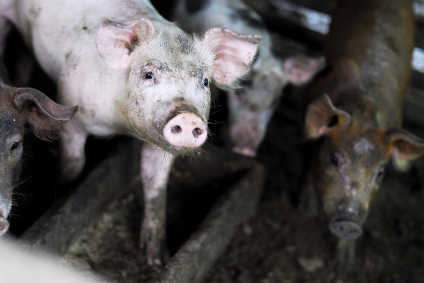
The UK’s Food Standards Agency (FSA) is preparing to release the results of its tests on meat and other produce for antimicrobial resistance after campaigners published new research indicating the overuse of antibiotics in farming is contributing to drug resistance.
According to a study commissioned by the Alliance to Save Our Antibiotics, a coalition of health professionals, animal welfare groups and other NGOs in the UK, there are “extremely high levels of E. coli resistant to essential antibiotics for treating serious human E. coli infections” on supermarket chicken and pork sold in the country.

Discover B2B Marketing That Performs
Combine business intelligence and editorial excellence to reach engaged professionals across 36 leading media platforms.
The study, conducted by scientists at Cambridge University, looked at 189 UK-origin pig and poultry meat samples from the seven largest supermarkets in the UK – Asda, Aldi, The Co-operative Group, Morrisons, Sainsbury’s, Tesco and Waitrose, the Alliance said.
“It tested for the presence of E. coli which are resistant to the key antibiotics for treating E. coli urinary-tract and blood-poisoning infections in people. The highly resistant ESBL E. coli was found on meat from all of the supermarkets. A staggering 51% of the E. coli from pork and poultry samples were resistant to the antibiotic trimethoprim, which is used to treat over half of lower urinary-tract infections. In addition, 19% of the E. coli were resistant to gentamicin, a very important human antibiotic used to treat more serious upper urinary-tract infections.”
In a statement to just-food, the FSA described AMR as “a significant threat to public health in the future”. It insisted “consumer safety is a priority for the FSA” and added: “Working with others across government, and with food producers, we aim to reduce the use of antimicrobials in food production animals. An important part of that work will be with food manufacturers, assurance schemes and retailers to develop standards for the responsible use of antibiotics in poultry, pig and dairy sectors. We are already testing meats and other produce for AMR and these results will be published soon.”
However, the FSA said: “The risk from AMR in all meats is low if they are handled and cooked properly. Poultry, pork, and minced beef and lamb products should be cooked thoroughly so that the meat is steaming hot throughout, there is no pinkness and any juices run clear.”

US Tariffs are shifting - will you react or anticipate?
Don’t let policy changes catch you off guard. Stay proactive with real-time data and expert analysis.
By GlobalDataThe Alliance said the study’s findings “provide further evidence that the overuse of antibiotics used to mass medicate livestock on British farms is likely to be undermining the treatment of E. coli urinary-tract and blood-poisoning infections in humans”. It added: “Some of the antibiotics tested are used in far greater quantities in livestock farming than in human medicine.”
Dr Mark Holmes of Cambridge University, who led the study, said he feared “insufficient resources are being put into the surveillance of antibiotic resistance in farm animals and retail meat”.
He said: “We don’t know if these levels are rising or falling in the absence of an effective monitoring system. These results highlight the need for improvements in antibiotic stewardship in veterinary medicine. While some progress has been made we must not be complacent as it may take many years before we see significant reductions in the numbers of antibiotic-resistant bacteria found in farms.”
Andrew Opie, director of food and sustainability at The British Retail Consortium, the association representing retailers in the UK, insisted its members had been “crystal clear in saying that antibiotics must be used responsibly”.
He said: “Treatment of animals with antibiotics is controlled and industry guidelines state that this should always to take place under the supervision of a vet. This ensures the right balance between the welfare of the animal and using medicines only when necessary.”
Opie said retailers, as members of the Responsible Use of Medicines Alliance (Ruma), “do not support the routine preventive use of antibiotics where such disease challenges can be prevented by better husbandry and farm management. Ruma does not support metaphylaxis”.
“The BRC and its members are involved in a Ruma task force recently established to discuss and determine meaningful targets that can be established to replace, reduce and refine antibiotic use in UK agriculture,” Opie said. “The European Parliament has also proposed legislation to ban routine preventive use.”
Opie said the BRC is working with suppliers “to minimise the prevalence of all bacteria, but customers still need to be mindful of the importance of safe handling and cooking of raw meat at home”. Supermarkets “provide clear and simple on-pack advice to help them with this”, he said.
According to Opie, the “global rise in antimicrobial resistance is down to a number of different factors including the over-use of antibiotics in humans and also environmental pollution”. ” As such, seeking further preventive measures for the evolution of antibiotic-resistant strains needs to be seen in its broader global context.”





